Jump to section
What is an informational interview?
What is the purpose of informational interviews?
Benefits of informational interviews
How to find people to interview
How to ask for an informational interview
For Business
Products
Build leaders that accelerate team performance and engagement.
Drive productivity through sustained well-being and mental health for all employees with BetterUp Care™.
Solutions
Transform your business, starting with your sales leaders.
Foster a culture of inclusion and belonging.
Customers
See how innovative companies use BetterUp to build a thriving workforce.
Resources
Best practices, research, and tools to fuel individual and business growth.
View on-demand BetterUp events and learn about upcoming live discussions.
The latest insights and ideas for building a high-performing workplace.
Innovative research featured in peer-reviewed journals, press, and more.
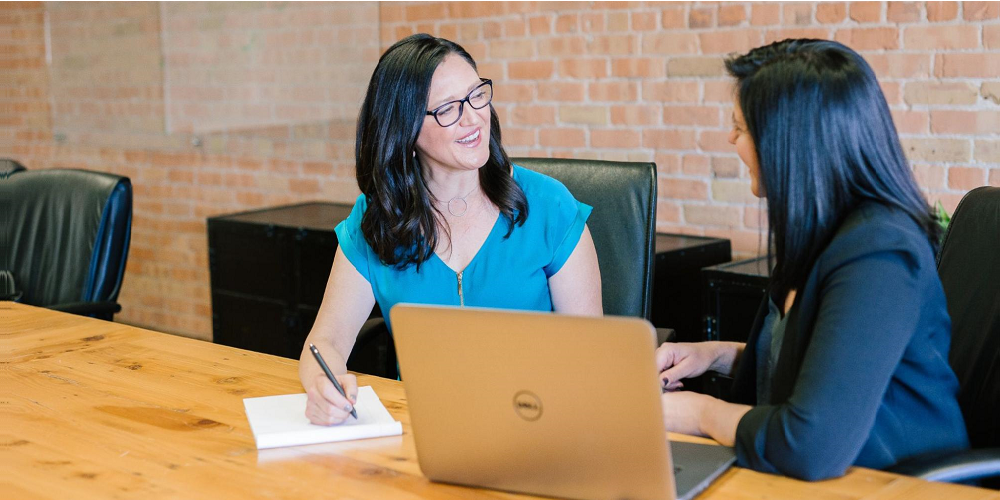
Jump to section
What is an informational interview?
What is the purpose of informational interviews?
Benefits of informational interviews
How to find people to interview
How to ask for an informational interview
Have you ever gotten the itch to try a new career but didn’t know if it would be a smart move?
What if you could ask someone everything you needed to know before making the big switch?
The good news is an informational interview can give you insight into a different role, company, and organization. With some preparation, you can start planning your next move.
Let’s break down what an informational interview is, the benefits of holding them, and how to conduct one.
An informational interview is a conversation with someone in a specific career field. The goal is to get a better understanding of their job.
Informational interviewing is not a job interview or always part of a job search. Rather, it’s a tool to learn more about a career path that piques your interest.
For instance, a soon-to-be college graduate may go through informational interviews to decide what kind of job they think they’d want after graduation.
Or, an employee looking for a career-change may conduct informational interviews to see where they want to specialize.

As of 2020, the average time spent in a job is about four years. This means most of us will change roles, companies, and career paths more than once in our lives.
If you’re looking to make a career change, an informational interview can help. It’s an excellent way to gather information about an area of interest before applying for new jobs. Regardless of whether they are just at a new company or in a completely different field.
Scheduling informational interviews can also boost your career and professional self-esteem.
Conducting a few informational interviews can be more valuable than what you can find online.
This insight equips and empowers you to take the proper steps, meet with the right people, and make the right choices so you can land your dream job.
Informational interviews can help you:
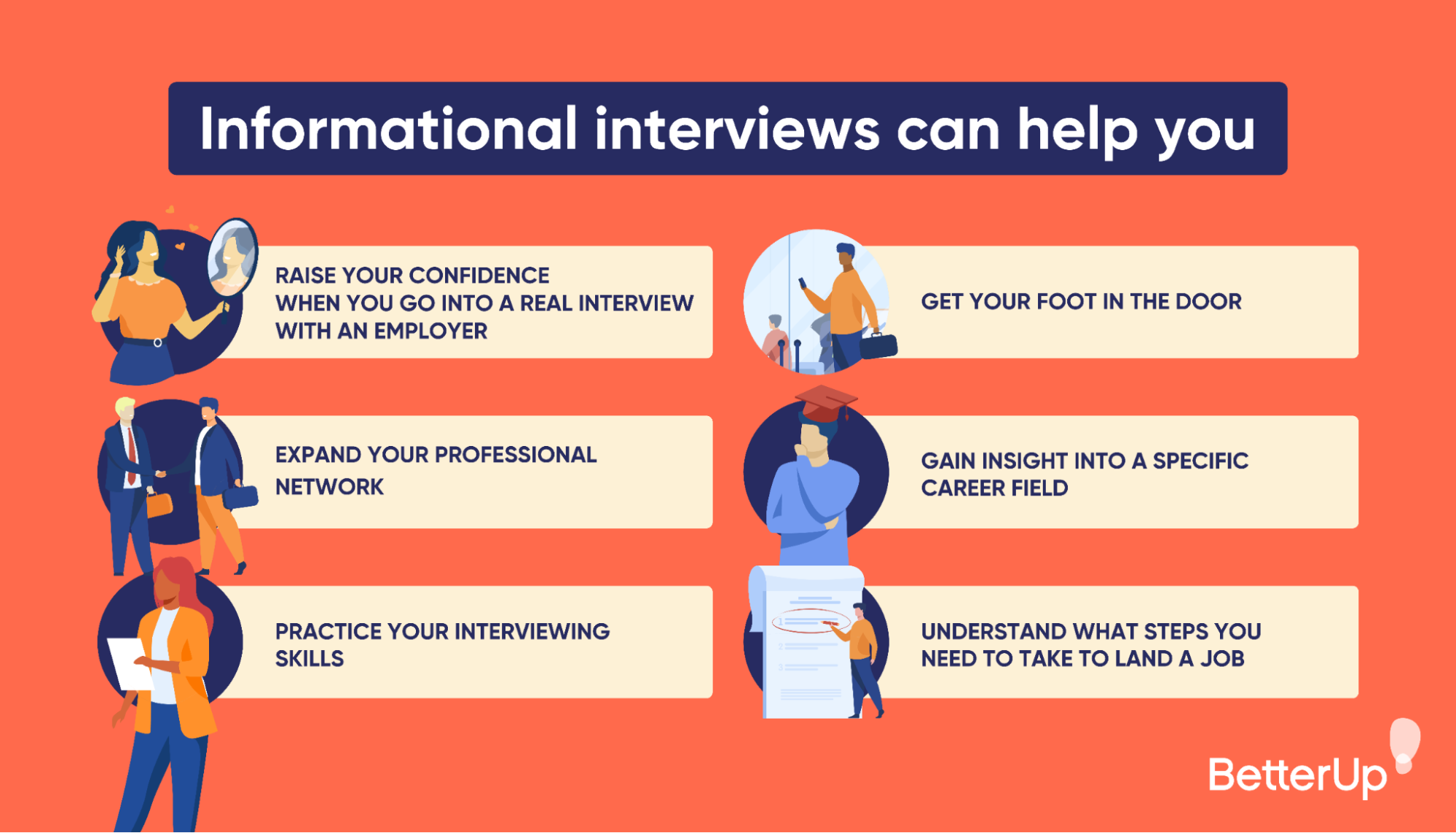
Conducting a few informational interviews can be more valuable than what you can find online.
This insight equips and empowers you to take the right steps, meet with the right people, and make the right choices so you can land your dream job.
Informational interviews can help you:
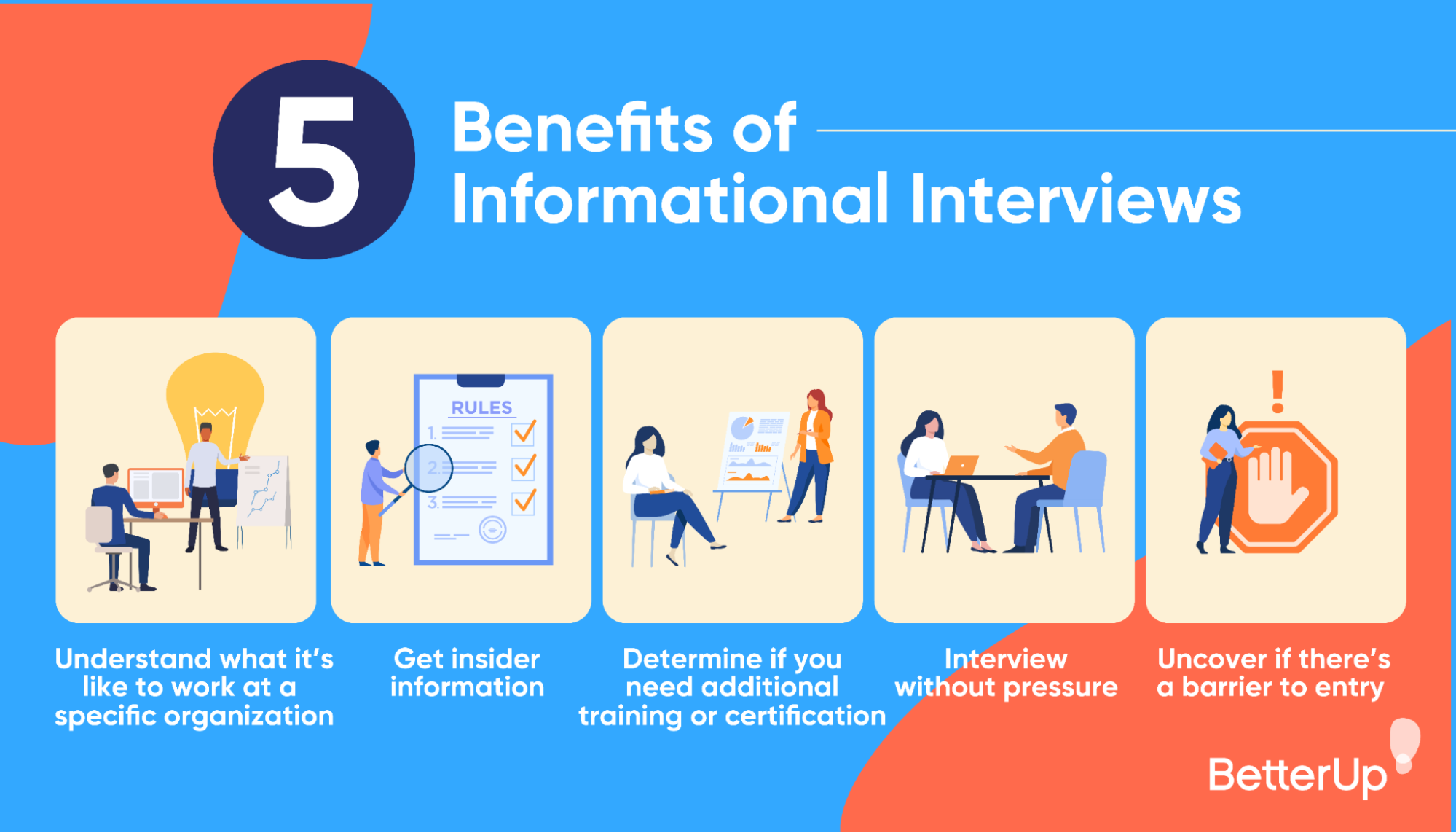
Besides the benefits we’ve already discussed, conducting informational interviews can help you:
Informational interviews give you insider tips you may not be able to find elsewhere.
For instance, you might learn how to land a position or professional associations you should join. You can also ask questions that help you build a targeted cover letter for a new role or company.
These insights can help you strengthen your job application, and they can also help you weigh the positive and negative sides of a different industry. Topics from salary to daily tasks provide valuable information about a role. You can then take all of this data to decide whether this is, in fact, the right move for you.
If you’re interested in working at a specific organization, informational interviews can help you see what working there is like. They can show you everything from what the work is like to the company’s culture and details around salary and benefit plans.
Informational interviews can help you determine if you lack a specific skill or certification for the position you want.
For instance, let’s say you’re a school principal interested in becoming a district-wide superintendent. You may find out that you need a doctoral degree instead of a master’s degree.
Traditional networking event can feel uncomfortable and awkward, even for the most outgoing individuals. With informational interviews, though, you mitigate some of that awkwardness by establishing a clear goal for the conversation: to learn more about a role, company, or industry.
You also have a list of questions at the ready to keep the conversation going and start building a valuable professional connection.
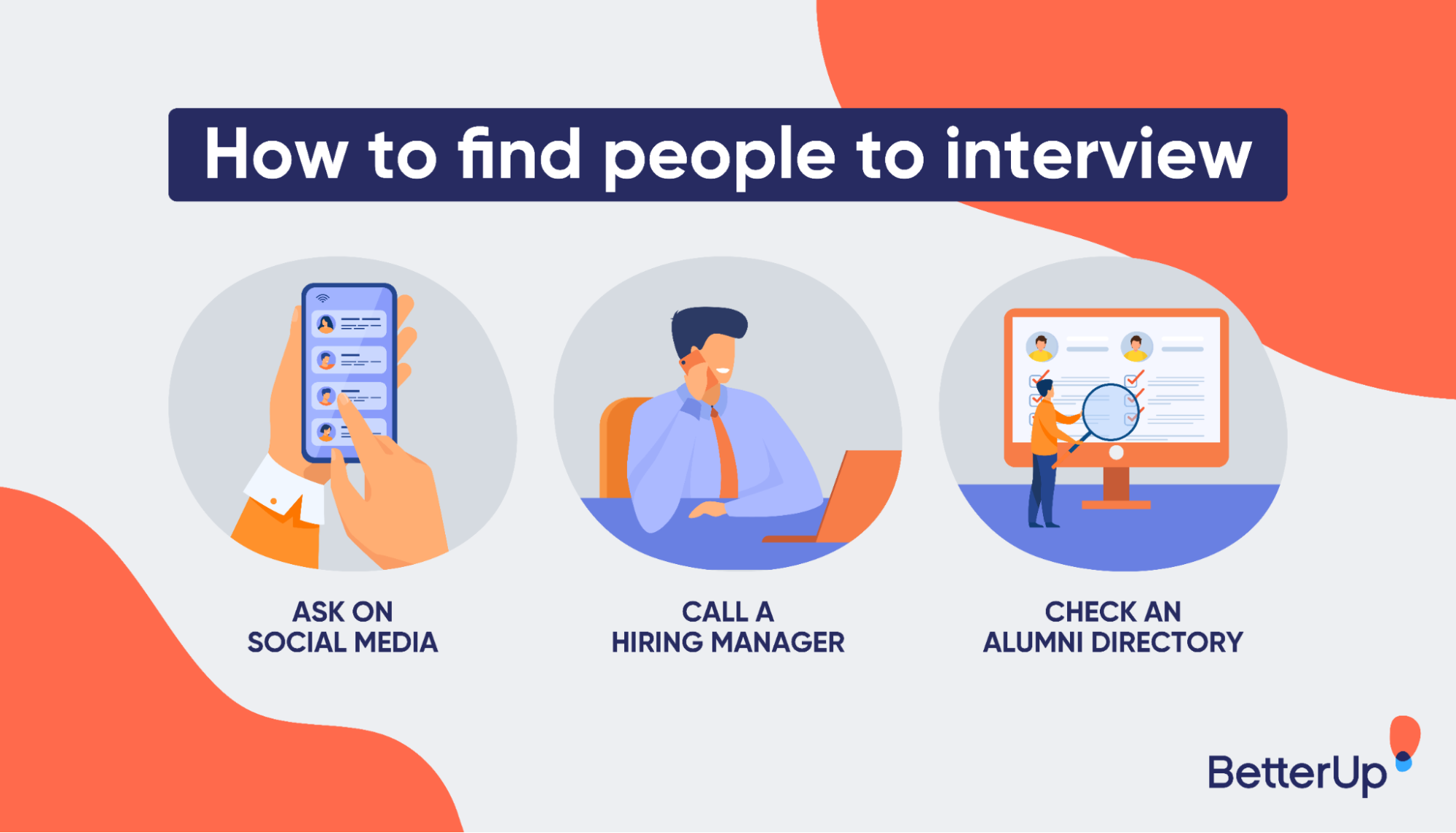
Finding the right people to have a chat with is easier than you may think. If you’re unsure how to find people to interview, try these strategies:
Many career professionals enjoy helping others succeed as long as they have the time for it.
To help increase your chances of landing an informational interview, make it as easy as possible for the person you’re interviewing.
For instance, offer to take them out to lunch (or coffee) or to jump on a video call or regular phone call if they are pressed for time.
Explain why you’re requesting an informational interview and who you are. Be clear and concise.
Subject: Informational interview request –– Laura Jones
Hi Ms. Powell,
My name is Laura Jones, copywriting intern for Michelle Brown. I’m reaching out because I’m interested in social media marketing, and I hear you’re the best person to gain insight from. I’m particularly interested in learning more about building out compelling social media advertisements.
I was wondering if you’d be available for a short information interview in the coming weeks. I hope to take you out for lunch or meet you on a video call to discuss what that career path looks like. I’m free Tuesday and Wednesday afternoons, from 2-4 pm PT, but I can move things around if there is a better time for you.
Thank you for your time. I hope to hear from you soon.
Sincerely,
Laura
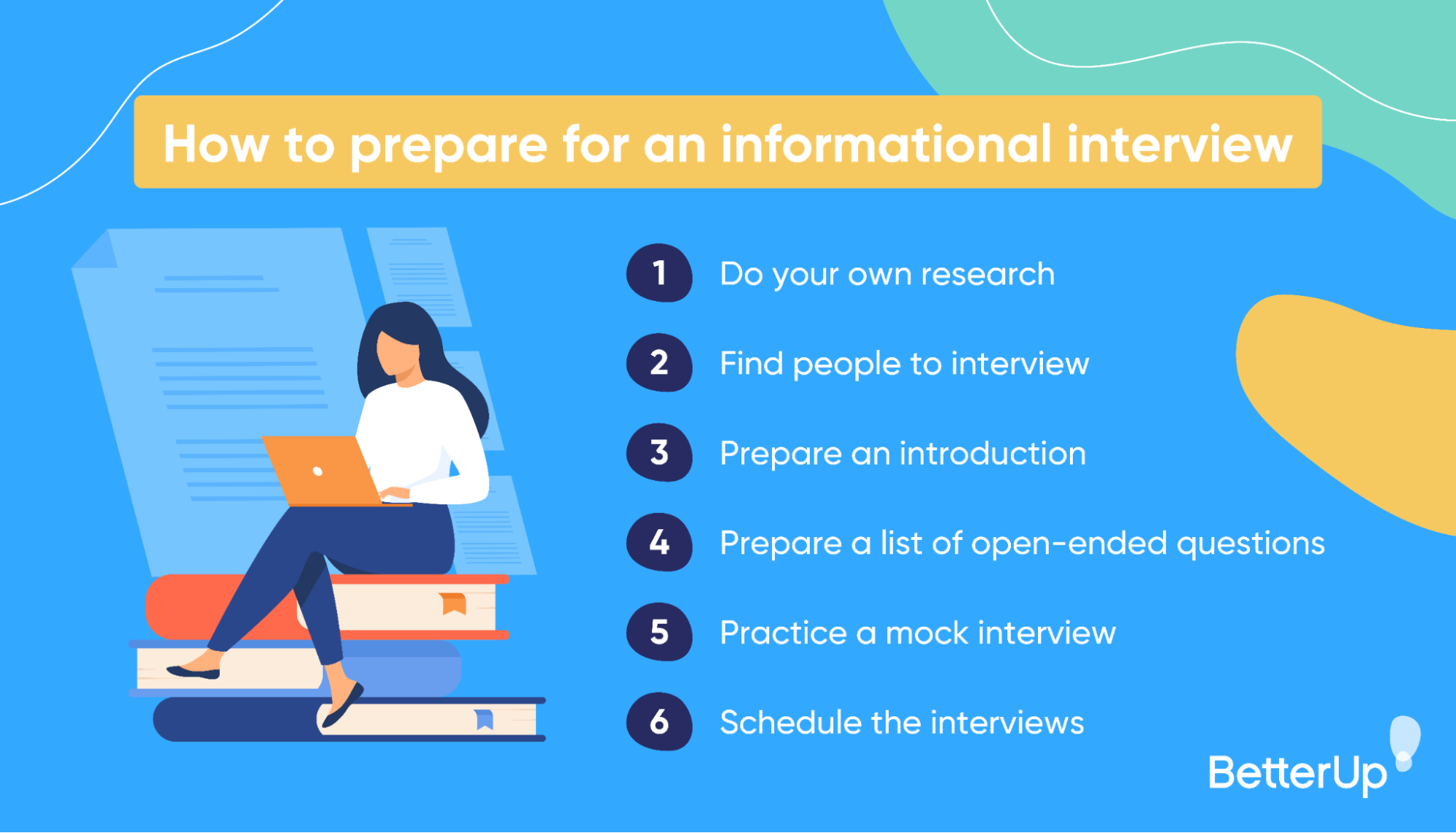
As with any interview, preparation is key. Here are seven steps for preparing for an informational interview:
Doing some career exploration on your own is essential. This means doing initial research into the career field and employer you want to work with. This will help you get a basic understanding of what that career is like and what credentials you’ll need.
For instance, if you’re interested in being a nurse, do an online search to see what kind of formal education and license is required.
You can still ask the interviewee what their career trajectory was like too. But make sure you lead with the information you gathered, so they know you did your homework.
Once you’re clear on the basic details of your career path, look for people to interview. Remember to check LinkedIn and your current network of friends, family, and classmates.
If you’re still struggling to find someone to interview, head to a career fair or meet with a career counselor.
Preparing an introduction is essential to kicking off the interview to a good start. Keep it brief and straightforward.
For instance, you can reiterate your name, your career goals, and what you hope to accomplish by the end of the meeting. You can also ask them to introduce themselves or share something unique (like why they decided to pursue their current career path).
Prepare interview questions ahead of time. Make sure each question is open-ended and covers something you may not be able to find out on your own. Don’t worry about having them all memorized, either. Remember, informational interviews are often less formal, and no one expects a robot.
When formulating your questions, keep in mind that the goal of an informational interview is to gather insight and not to get a job offer. So while that could be a delightful bonus, your questions should be curated with this intent in mind.
Here’s a list of 14 sample list of questions to get you started:
Grab a friend or colleague and practice your introduction and interview questions.
Not only will this help you feel more prepared for your official interview, but it may also reveal other interview questions you should ask.
After you’ve found people to interview, send them an email.
Keep your introduction simple. Include your name, any common contacts, and a specific reason why you’re reaching out to them. If you can call out their expertise in the field, for example, that’s good to include.
It’s also important to be ready to ask questions on the spot if the interviewee says they won’t be available any other time. This is why it’s beneficial to prepare specific questions before scheduling interviews.
How you end an informational interview is just as important as how you start one. Make sure you conclude and leave a good impression by:
Rather than thinking of the interview as a one-time meeting, consider how you’ll develop a future ally and supporter.
To make a solid first impression, make sure you follow up after the interview. Send a thank-you note or email after the meeting thanking the interviewee for their information and time. This note doesn’t have to belong, but it should reiterate your gratitude and reiterate any key takeaways from the meeting.
To cultivate a long-term professional relationship, keep up with the interviewee over time. Ask to connect with them on LinkedIn and congratulate them on achievements they share publicly.
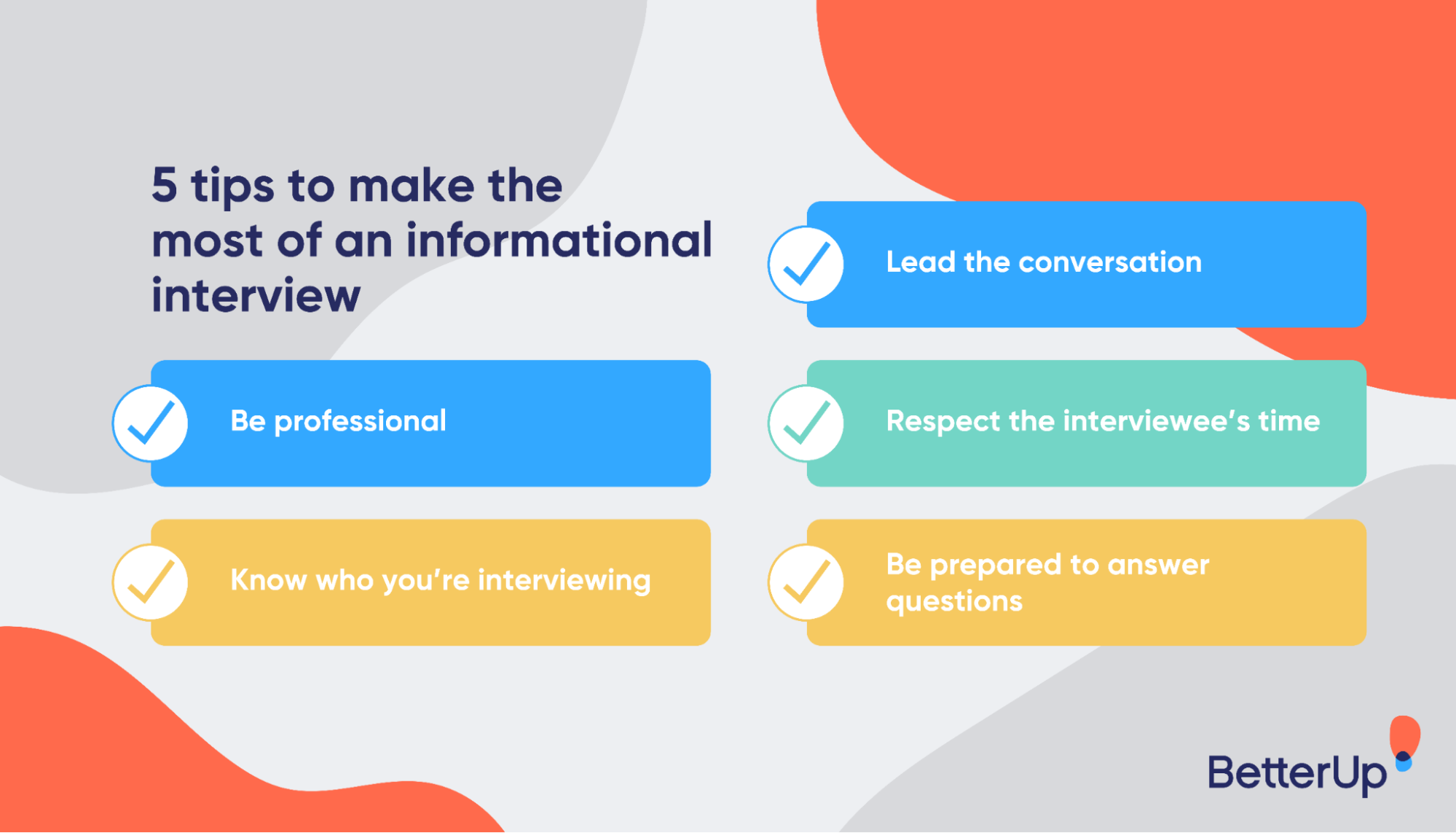
Here are five informational interview tips to help you conduct a successful interview:
Although it’s okay to show your personality, remember that each interview is a business appointment, not a night out with friends. Conduct yourself in a professional manner. Show up to the interview a few minutes early. And don’t dress too casual or formal — regular business attire is perfect.
Make sure to research the person you’re interviewing ahead of time. You’ll need to know how to pronounce their name correctly, what title they currently have, and what company they work for.
Use Google or LinkedIn to do some research on their career history too.
Remember that you, the interviewer, are in the driver’s seat. Be prepared to start, steer, and end the conversation appropriately.
Be considerate of the interviewee’s time. Try to keep the conversation between 20–30 minutes. You can set aside five minutes for the introduction, 10–15 minutes to ask questions, and 5–10 minutes to wrap up the conversation.
Your contact might ask you questions, too, so be ready to answer some basic questions or come prepared with an elevator pitch about yourself.
Ready to ace your informational interview?
We hope these tips are just what you need to ace your next informational interview.
Craving more professional development tips? At BetterUp, we specialize in helping individuals reach their fullest potential. Reach out to see how we can provide the support you need.
Managing Editor
Products
Solutions
Customers